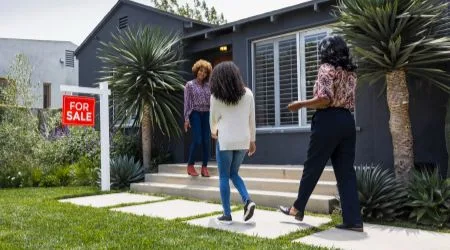🔥Pro tip: How much you can borrow will be determined by your current income. How long you've been in your current role and how steady your employment is will also affect your ability to get a home loan. It's best to apply at least until after you've passed your probation period. Lenders like to know your employment is steady. If you're a self-employed borrower, you'll likely have to provide more documentation, like tax returns for two years, so check with the lender on their requirements.
Tip #1: Check you meet the requirements
To get a home loan in Australia you need to be over the age of 18, and a citizen or permanent resident of Australia, or married or in a de facto relationship with an Australian citizen or permanent resident.
Most lenders will also look at your credit history, employment status, residency and income when reviewing your home loan application. If you're living in Australia on a temporary visa, you may qualify for a home loan. It depends on your visa type, and you'll likely need a 20% deposit. Most states will charge additional duty for foreign citizens.
LEARN MORE: Start your journey to buying your first home with the help of Finder's home loan experts.
Tip #2: Check your credit score
Your credit score and history will tell the lender what kind of borrower you are. The higher your score, the better chance you have of a lender approving your loan application. There are some lenders that service loans for average scores, but at a higher interest rate.
🔥Pro tip: You can check your credit score by ordering a free copy of your credit report here. If you don't have a good enough credit score, there are steps you can take to improve it. Something as simple as paying your bills on time will have a positive impact on your score.
Tip #3: Pay off existing debts - that includes AfterPay
Lenders will look into your debt to income ratio, that is, what proportion of your income goes into servicing debt. The higher your debt, the less disposable income you'll have. By improving this ratio, you can increase your chances of getting a home loan. If you have any unsecured or high interest debt, you should think about reducing or paying this off as soon as possible.
🔥Pro tip: Focus on paying off your buy now pay later account as soon as you can, with a goal of having at least 6 months' worth of 'clean' bank statements before you apply for a home loan.
Other ways to maintain "clean account conduct" are things like no online gambling, no transfers to online betting accounts etc.

Tip #4: Work out your borrowing power
Before you pick a house and apply for the loan, you need to work out how much you can borrow. The average first home buyer home loan is $533,852, but how much you can borrow depends on factors like your income, expenses, debts and number of dependents. If your debt to income ratio is too high or you have too many expenses, lenders may see you as higher risk. Use a borrowing calculator to figure out how much you may be able to borrow. You can also use a repayment calculator to help you figure out what your loan will cost you and whether you can afford it.

"Know your numbers! Understand how much you can afford to pay back to the bank as opposed to how much the bank is willing to give you. Home ownership is great, but you don't want to working solely to pay your mortgage repayments."
Tip #5: Take note of additional costs
There are more costs involved with buying your first home than just the loan itself. Upfront costs can include the deposit, Lender's Mortgage Insurance, stamp or transfer duty and bank and legal fees.
There may also be ongoing costs such as the interest on the loan and expenses like council rates, utility costs and strata fees. You should also take into account home and contents insurance. Unlike if you're used to renting you will also need to cover the cost of any home improvements or repairs.
LEARN MORE: About the upfront and ongoing costs associated with buying your first home.
🔥Pro tip: It's possible that as a first home buyer you may get a stamp duty discount. Different states and territories have different rules on stamp duty so it's also important to check your local rules. For example, NSW has recently made changes to its stamp duty. First home buyers can now choose between paying stamp duty or an annual property tax.
Tip #6: Check for any first home buyer concessions
Traditionally, your home loan deposit will need to be 20% of the value of the loan. But there are ways you may be able to use a 5% or 10% deposit, like by paying lenders mortgage insurance (LMI). Remember that if you pay with a smaller deposit, this would increase the size of your loan and it could take longer to pay off.
🔥Pro tip: Keep an eye out for government incentives like the First Home Guarantee Scheme (formerly the First Home Loan Deposit Scheme). With this scheme you can buy a home with as little as a 5% deposit and not pay LMI. There are limited places and other criteria so it is important to check your eligibility.
Tip #7: Find the right property
Finding the right property is important for both you and the lender. There can be lending restrictions on certain properties and suburbs, so it's best to check with the lender before you submit the loan application.
You also need to consider your own wants and needs when choosing the right property, although you may be happy to sacrifice on some aspects for your first home if you plan to buy again in the future. You should consider whether you want to buy a new or a used home, as well as its fixtures and fittings, power supply, lighting, ventilation and even NBN access. Consider the location too and its proximity to public transport, shops and green spaces.
🔥Pro tip: Create a checklist. This can include what you want from the property (e.g. the number of bedrooms, natural light, size of garden etc.) and what to look for when inspecting it (e.g. fixtures, mould, water damage, ventilation). Also consider whether you're willing to put any work into the house with renovations and updates.
Tip #8: Book inspections
Inspecting the property before you buy is an important thing that often gets overlooked by people buying their first home. But as the largest purchase you'll probably ever make, it's key to make sure you're getting a quality property for the price you're paying. Get building and pest inspections so you're not stuck with a collapsing, termite-infested disaster, and be sure to take out insurance. Examine the quality of the property's fittings and construction as best you can and if there are obvious repairs needed (and you're okay with taking them on board), make sure you get a quote for repairs and factor that into your budget.

"Persevere! Buying a home is a marathon not a sprint. You may have to view 100 homes before you come across the one you really want. It can be a very stressful and emotional time, but having the right people on your side will reduce some of the stress. Saving for your first home will seem like forever, but keep squirrelling away."
Tip #9: Apply for pre-approval
Once you've gotten a clearer idea of whether you're eligible and whether you can afford a home loan, you should approach your lender for a pre-approval. Pre-approvals don't guarantee you'll get the loan but they are useful for several reasons:
- You know exactly how much you can borrow. This information can give you parameters for your search like where you can afford to buy and how much you can pay.
- Pre-approvals can speed up the loan process. In a hyper-competitive property market, it's best to go in armed with a pre-approval. This is because you'll be competing with other borrowers and the last thing you want is to miss out on your dream property because of lagging paperwork. You'll also be in a better position to negotiate and sign the contract.
🔥Pro tip: Always engage a licensed conveyancer to look over your contract. They can help you with the ins and outs of the legal process, including title searches and reviewing your contract. They will act as a middle person between you, the seller, the lender and the government.
Tip #10: Compare home loans
Before you settle on a lender, you should shop around and look at the market and its offerings. There are many types of loans, from variable to fixed rate loans, to interest-only and investment loans. Some lenders may offer loans with better features and, just as importantly, better interest rates. Don't settle until you have a clearer picture of the market and until you're getting the best.
🔥Pro tip: Consider expert help. Buying your first home can have a lot of different factors to it, but there are professionals who can make the process easier. Consider a buyer's agent, who will help you with the entire process, from property search to negotiating. A mortgage broker, meanwhile, can help you navigate the loan market.
4 tips on how to save for your first home

Finder survey: What do Australians think is the most important factor when looking for their first home loan?
| Response | Female | Male |
|---|---|---|
| Interest rate | 9.15% | 6.74% |
| Fees | 1.53% | 1.54% |
| Speed of approval | 1.02% | 1.16% |
| Offset account | 0.85% | 0.96% |
| Extra repayments | 0.68% | 0.19% |
| Lender reputation | 0.68% | 0.58% |
| Wider eligibility criteria (e.g. self-employed docs) | 0.68% | 0.58% |
| Other | 0.17% | 0.19% |
Sources
Ask a question
6 Responses
More guides on Finder
-
What is the Regional First Home Buyer Guarantee?
The Regional First Home Buyer Guarantee lets low deposit borrowers buy or build in regional Australia while avoiding LMI costs.
-
First Home Guarantee Scheme
The First Home Loan Deposit Scheme will let new buyers borrow 95% and avoid paying thousands in lenders mortgage insurance premiums.
-
First home owners grants
Find out what concessions are available to you under the First Home Owner Grant (FHOG) in your state with our comprehensive guide.
-
The First Home Super Saver Scheme explained
The First Home Super Saver Scheme explained.



the First Home Savings Account here is ancient, not updated since 2010. All the dollar limits have since been changed AND the whole scheme has subsequently been scrapped.
Hi Peach,
Thank you for your feedback, we’ve now updated the page so it’s relevant for our users.
Cheers,
Shirley
Dear sir/madam
I am buying an established property from a seller
for $216,000 in fifteen months time to be paid in
cash from my own savings. The seller is still paying for the mortgage. Could you please tell me
how and to whom and in what manner should this money be paid?
Should the payment be made before or after the documentation has been completed?
Could you please give me an estimate of all other cost including the GST.
Hi Jim,
Thanks for your question.
Usually, payment is made when the seller and the buyer exchange signed copies of the contract of sale. If you are using a solicitor to draw up the documents then they may be able to advise you how the money should be paid, as the payment terms may be specified in the contract.
As for GST, the ATO has a GST Property Tool that can calculate the GST that will be payable in the sale.
I hope this has helped.
Thanks,
Elizabeth
is the first home owner grant only for new homes
Hi Philip,
Thanks for your comment.
Yes the FHOG is only for new homes.
Cheers,
Shirley